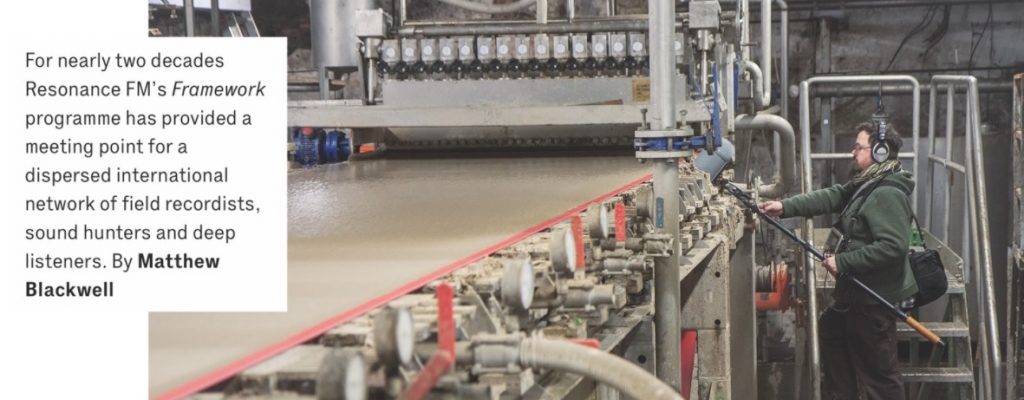from the wire magazine‘s radio special (issue 449), written by matthew blackwell:
Patrick McGinley considers himself to be anything but a radio host. “I’ve always considered Framework the mouthpiece for a community,” he explains. “A widespread virtual global community of artists working with field recording. So the show is made by them, and I am its technician, custodian, zookeeper.”
However he describes his role, McGinley has been at the centre of Framework, which in turn has been a linchpin of London arts radio pioneer Resonance FM’s programming schedule, for nearly 20 years and over 750 episodes. The show, a weekly hour-long mix of field recordings, musique concrète and audio verité, exemplifies Resonance’s role as a platform for new sounds and perspectives. “Resonance is all about opportunity and discovery,” says McGinley. “The opportunity for an otherwise unheard voice to be heard, the discovery of sounds you won’t hear anywhere else. This is a perfect fit for Framework – listening to what has not yet been heard is precisely what the show is about.”
McGinley became enamoured of radio after he discovered the late-night programming of Boston College’s WZBC station (tagline: “No Commercial Potential”). After moving to London in the early 2000s, he saw his chance to “return the favour for the next generation of curious listeners” when Resonance sent out a call for programme proposals. He and co-host Joel Stern nabbed one of Resonance’s first slots. The station began airing on 1 May 2002 and Framework premiered six weeks later.
Stern moved back to his native Australia after a year (and now continues to engage with sound through Melbourne’s Liquid Architecture organisation) but McGinley continued the show solo, walking to the Resonance studio on Denmark Street in Soho on Friday nights, “dodging through all the drinkers and revellers in the street, and slipping into the relatively quiet calm of the studio with my stack of CDs and records”. This era came to an end in 2007, when Resonance moved to South London and McGinley left the capital, but continued to produce Framework episodes from France. These days he’s based in Estonia, and the programme is now broadcast from some 14 stations around the world, though Resonance is still the show’s “spiritual home”.
Framework is defined by McGinley’s masterful mixing. Rather than playing tracks in succession, he overlaps them for several minutes at a time. Sounds intermingle across tracks, and without artist attributions it is impossible to distinguish their sources. For example, Episode 756 begins with a child laughing, water splashing, dishes clattering, a piano in a minor key, long hollow drones, bursts of static and wooden creaks. A careful perusal of the episode’s playlist reveals that most of these sounds are derived from Yenting Hsu’s “Begonia flowers 海棠花”, but the drones are from Alexandra Spence’s “Tidewater”, while the static and creaks are from Stéphane Marin and Ludovic Medery’s “s’introbruit”.
McGinley assigns himself the role of audio chef de cuisine. “I’ve discovered over the years that almost anything can sound good with almost anything else, if it is mixed carefully and sensitively,” he explains. “There’s a lot of chance in how I mix a show – I select the ingredients, throw them in a pot, stir them up, see how they settle, adjust the seasoning, and see how it sounds. Usually, it sounds pretty good.”
Aside from the aesthetic impetus behind this mix and match approach, McGinley’s selection of tracks seeks to be inclusive. “I don’t really distinguish between ‘established’ and ‘lesser known’ artists. I don’t see any reason to.” Yet he does “try to strike some balance of diversity, geography and gender in the show”.
The above-mentioned artists are a case in point: Yenting Hsu, a sound artist from Taipei, Taiwan, self-released her album Relight+MUSIC, while Alexandra Spence’s A Necessary Softness is her second for Brisbane, Australia’s Room40 label. Meanwhile, Marin and Medery’s collaboration crosses the border between France and Belgium to become only the fourth release on the new German label Weber & Alcantu.
Framework is unique in its radical juxtaposition of newcomer and seasoned veteran, wherein an amateur’s first recording may be combined with – or even confused with – an established artist’s newest piece. In addition to soliciting submissions from any and all field recordists, McGinley invites his listeners to record their own introductions to the show and he features guest hosts for the biweekly framework:afield series.
It’s all in service to his conception of radio as a basis for community. When Framework began in 2002, he saw that radio was “about collective experience, hearing something at the same time as someone else was hearing it. It was a form of community, of being connected to other listeners.” Despite the rise of on-demand listening and podcasts, it’s still the goal to maintain that connection any way possible. “People want to listen when they want to listen, so collective listening has become scattered. We still listen ‘together’, but we don’t listen together at the same time.”
matthew blackwell, 2021.05
photo: lauri kulpsoo
